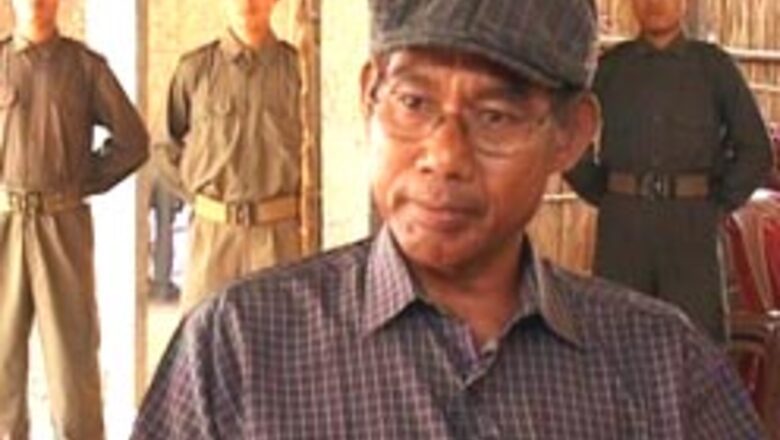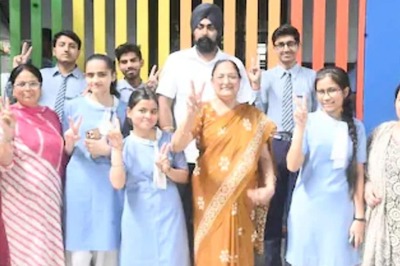
views
In an exclusive interview, General Secretary of National Democratic Front of Bodoland (NDFB), Basumatari Swmkhwr reveals to V K Shashikumar, Special Investigations, CNN-IBN, his plans to liberate Bodos from economic suppression and oppression.
V K Shashikumar: During the ceasefire there seems to be a concerted effort to ensure that arms are not visible. Is it part of the discipline that you have inculcated, or is it symbolic, through which you are trying to give a message?
Basumatari Swmkhwr: The present situation is for peace and we are on the peace processes and arms is not necessary at this moment. And since the use of arms is not necessary at present, we don’t want to show arms. We haven’t been threatened by any other organisations till now so we don’t feel the show of arms is necessary at present.
V K Shashikumar: Can you shed some light on your relationship with other struggles in the region and how that has helped you put your cause forward?
Basumatari Swmkhwr: We had a relationship with National Socialist Council of Nagaland (NSCN) and United National Liberation Front (ULFA) and other militant groups of the northeast. But after having ceasefire with the Government India we are not in close terms with those organisations. Still we are trying to keep a communication with them.
We are different because of all the issues and problems on these parts but we face the same problems.
V K Shashikumar: What are going to do next after the one-year deadline?
Basumatari Swmkhwr: The ceasefire agreement period will terminate next month. We are expecting the Government of India to invite us for discussion. If the Government does not do as per our expectation, then we will have to think otherwise, just keep our struggle going.
V K Shashikumar: Is it true that the losses that suffered in Bhutan during the joined Bhutanese army and Indian army action actually compelled you to go to a ceasefire?
Basumatari Swmkhwr: No. There is actually no need for much human power and also the arms power for Guerilla wars. It is necessary to have more human resources and more arms power for conventional war. However, few members are enough to do or to damage the enemies. We lost so many arms and men in the operation in Bhutan, but that is not the situation that compelled us to have ceasefire argument with Government of India. We are still powerful so as to continue our struggle.
PAGE_BREAK
V K Shashikumar: How strong are you?
Basumatari Swmkhwr: We are still strong enough. We can strike India if we want to. We can damage India with resource and power, whatever we have at present.
V K Shashikumar: Sovereignty is the core issue for ULFA. Have your leadership and the ULFA leadership been talking because ultimately you have to co-exist within this society in Assam.
Basumatari Swmkhwr: We had had a communication with ULFA. But after this ceasefire agreement we didn’t have any communication with them.
V K Shashikumar: But do you have a common vision?
Basumatari Swmkhwr: The vision which the ULFA is expressing through their media is the fight for the sovereignty of Assam as for us, we are struggling for the liberation of Bodo land that is liberation from alien’s occupation. We want to liberate our people from suppression, economic suppression and oppression.
V K Shashikumar: Would you agree to an autonomous region within the state of Assam?
Basumatari Swmkhwr: No. BLT has agreed the autonomous region within the state of Assam already Bodo Land Territorial Autonomous Council. But we are struggling for the liberation of Bodo land. That means we want to liberate the land owned by the Bodo people which was occupied Bodo people, from the prehistoric age. The land that have been inherently given to us by our forefathers and is at present occupied this Government of India illegally. Government of India doesn’t allow us to live as a free people.
V K Shashikumar: Is this a secessionist demand?
Basumatari Swmkhwr: The term secession is not applicable to us so to say, because Bodo land is so to say the northeast was not the part of India.
V K Shashikumar: Is it a question of independent principality?
Basumatari Swmkhwr: No. The British brought this rule after they came to India. Northeast was not a part of India. It was separate, it was independent and only the British forcibly submerged it to India. And the independence struggle against the British, many of the people of this land, many of the leaders of this area demanded that this northeast should not be made the part of India, it should be kept independent even after British left. And Government of India did not allow it.
PAGE_BREAK
V K Shashikumar: Isn’t history contentious? The argument that the British colonial regime actually did the job of unifying various disparate principalities…they built a railway line in this region connecting places. Aspects of demand for accompanied independence in the context of South Asia, maybe it is not feasible?
Basumatari Swmkhwr: No whether it will be feasible or not feasible it will depend on this plans and programs of the people of the region. The whole northeast is very resourceful. We have so many, it is, resources this mineral resources. Economically so to say, this present Assam and other parts this Nagaland and Meghalaya, we have so many resources. Economically we can survive and if this part is granted, granted means if this part is liberated then it will, it will be self-sufficient.
V K Shashikumar: Why do you think that the autonomous hill council, the territorial council has failed to satisfy the democratic aspirations of the Bodo people?
Basumatari Swmkhwr: The Bodo people have been struggling for a separate state starting from 1967. That time many of the Bodo leaders felt that the Bodo people are politically suppressed, not only politically but economically also they are suppressed and exploited by the state government of Assam. And because of that during those days, the Bodo leaders and also the Assam tribal leaders felt that they need to be separated from the exploitation and separation of the Assamese rulers. They started struggle in 1967 under that political party, Plains Tribal Council of Assam, demanded for a separate state within India constitution. Till 1986 they were on the struggle then after 1986 the struggle of PTCA became weak and they borrowed land within Indian constitution. And after 6 years struggle they got agreement with Government of India and the provision of Bodo land Autonomous Council.
V K Shashikumar: What is the kind of vision or political arrangement that want that would genuinely satisfy the aspirations of the Bodo people?
Basumatari Swmkhwr: The struggle of NDFB, the aims and objectives of NDFB is to have both political rights and economic rights free from other’s clutch. That means that we want the Bodo people should have a complete freedom and let us rule through our traditional practice, overall rights of our land in our own hand. Because, though we were a free nation in past, our right of our land has been taken away and our traditional customs and laws have been destroyed.
PAGE_BREAK
V K Shashikumar: Is the battle really against the Constitution of India? Or the battle is against the Indian state?
Basumatari Swmkhwr: This is battle of Indian state and also battle of Indian Constitution. Indian state though it says that it is ruled by democracy, though it says federal system, but states under Government of India don’t have the right to exercise, to utilise their own resources. All the resources, whether it is their mineral or the other resources has been controlled by the Center. And the Constitution and the Constitutional Law are not applicable to traditional way of many of the indigenous people in different parts of India. Their ethnic customs and this customary laws are bullied by the Indian Constitution so in case of our, and in other indigenous peoples, the struggle is against both the state of India and the Constitution of India.
V K Shashikumar: The assertion of rights through an arms struggle is really a hidden war…because it is not a war which is visible?
Basumatari Swmkhwr: Actually this arms struggle was forced by the Government of India because in many parts many people, many small nationalities are trying to have their grievances through democratic struggles. But in those struggles the Government of India did not do much or did not listen to their grievances. And rather they tried to crush those struggles by violent means by using police forces. If those struggles were solved by a democratic process, through discussion, through a peaceful process, then there would not come the question of armed struggle. If the Government of India really tries to solve all the problems through democratic means then I think there will be no arms struggle in different parts of India.




















Comments
0 comment